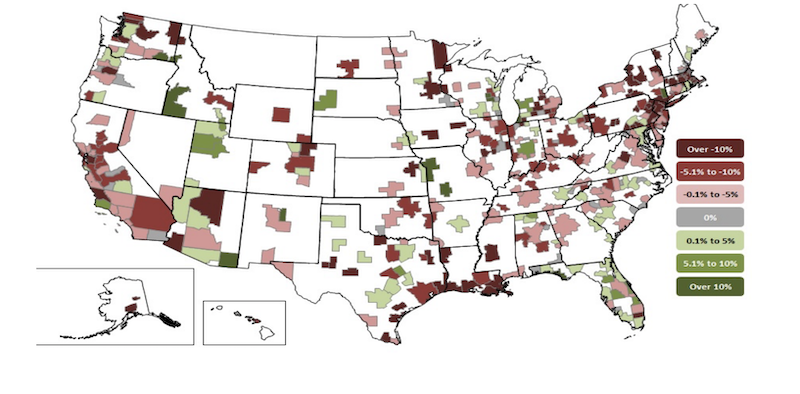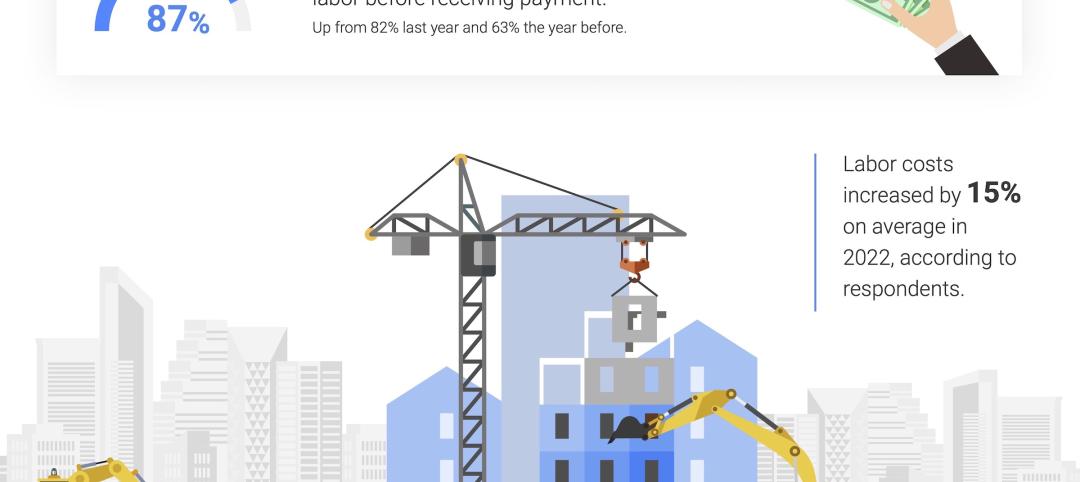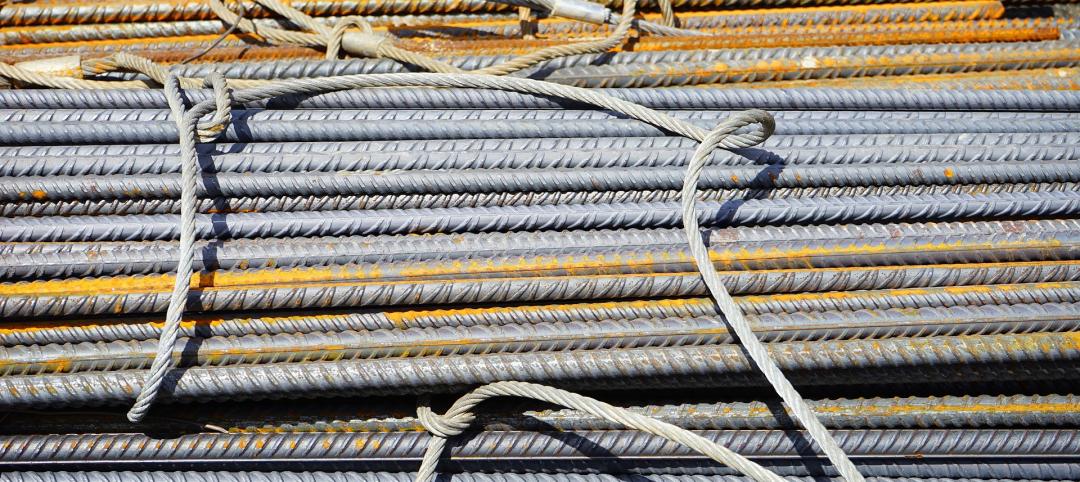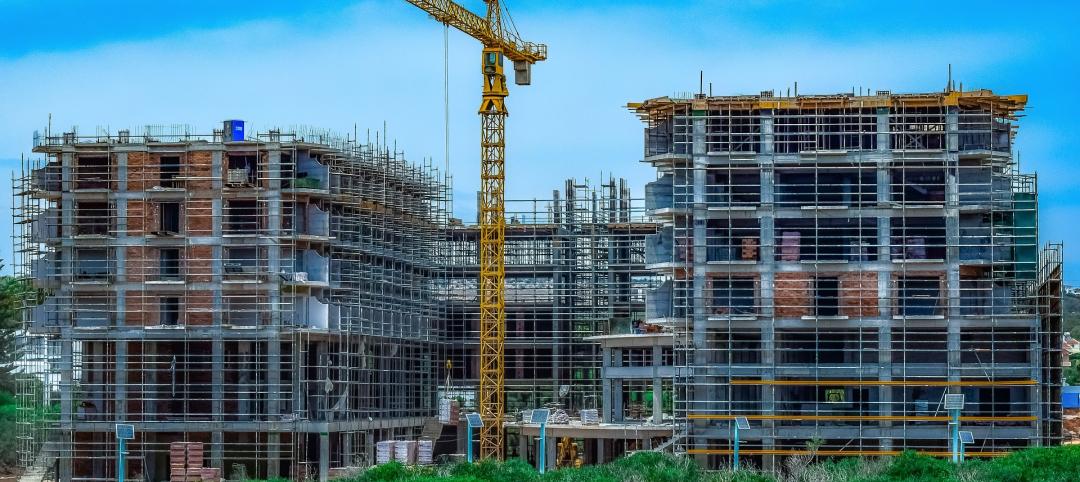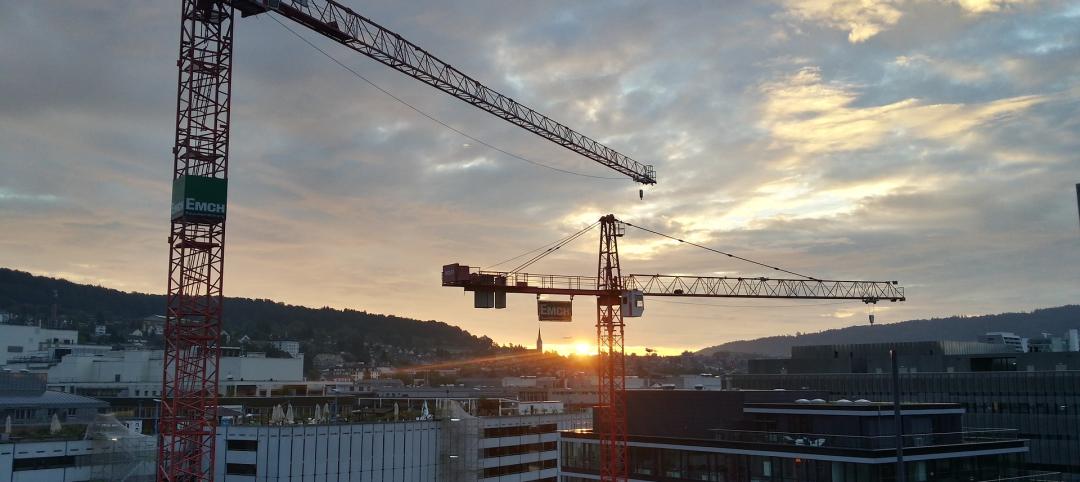Construction employment in July remained below the levels reached before the pre-pandemic peak in February 2020 in 36 states, according to an analysis by the Associated General Contractors of America of government employment data released today. Association officials said construction employment would benefit from new federal infrastructure investments and urged the House to quickly pass the bipartisan infrastructure bill.
“This data shows that full recovery remains elusive for construction in most states,” said Ken Simonson, the association’s chief economist. “In fact, the fast-spreading COVID-19 delta variant may make it harder to find employees eligible to work on restricted sites and may also depress demand if some owners defer projects.”
From February 2020—the month before the pandemic caused project shutdowns and cancellations—to last month, construction employment increased in only 14 states and was flat in the District of Columbia. Texas shed the most construction jobs over the period (-56,200 jobs or -7.2%), followed by New York (-52,600 jobs, -12.9%) and California (-35,100 jobs, -3.8%). Louisiana recorded the largest percentage loss (-15.3%, -21,000 jobs), followed by Wyoming (-13.5%, -3,100 jobs) and New York.
Of the states that added construction jobs since February 2020, Utah added the most (7,900 jobs, 6.9%), followed by North Carolina (5,700, 2.4%) and Idaho (4,400 jobs, 8.2%). The largest percentage gain was in Idaho, followed by South Dakota (7.5%, 1,800 jobs) and Utah.
From June to July construction employment decreased in 18 states, increased in 30, and was unchanged in Kansas, Tennessee, and D.C. The largest decline over the month occurred in Colorado, which lost 1,600 construction jobs or 0.9%, followed by a loss of 1,500 jobs each in Oklahoma (-1.9%), Texas (-0.2%), and Pennsylvania (0.6%). The steepest percentage declines since June occurred in New Hampshire (-2.2%, -600 jobs), followed by 1.9% losses in Oklahoma and Arkansas (-1,000 jobs).
North Carolina added the most construction jobs between June and July (4,300 jobs, 1.8%), followed by New Jersey (4,000 jobs, 2.7%) and Illinois (3,700 jobs, 1.7%). The largest percentage gains were in New Jersey and Connecticut (2.7%, 1,500 jobs), followed by South Carolina (2.4%, 2,600 jobs).
Association officials warned that construction employment was being impacted in many parts of the country because of supply chain challenges and growing market uncertainty caused by the resurgent Delta variant. They said new federal infrastructure investments would provide a needed boost in demand and help put more people to work in construction careers.
“New federal infrastructure investments will help put more people to work in high-paying construction careers,” said Stephen E. Sandherr, the association’s chief executive officer. “The House can help put Americans back to work by immediately approving the infrastructure measure that passed the Senate with broad, bipartisan support.”
View state February 2020-July 2021 data and rankings, 1-month rankings.c
Related Stories
Contractors | Apr 19, 2023
Rising labor, material prices cost subcontractors $97 billion in unplanned expenses
Subcontractors continue to bear the brunt of rising input costs for materials and labor, according to a survey of nearly 900 commercial construction professionals.
Data Centers | Apr 14, 2023
JLL's data center outlook: Cloud computing, AI driving exponential growth for data center industry
According to JLL’s new Global Data Center Outlook, the mass adoption of cloud computing and artificial intelligence (AI) is driving exponential growth for the data center industry, with hyperscale and edge computing leading investor demand.
Healthcare Facilities | Apr 13, 2023
Healthcare construction costs for 2023
Data from Gordian breaks down the average cost per square foot for a three-story hospital across 10 U.S. cities.
Higher Education | Apr 13, 2023
Higher education construction costs for 2023
Fresh data from Gordian breaks down the average cost per square foot for a two-story college classroom building across 10 U.S. cities.
Market Data | Apr 13, 2023
Construction input prices down year-over-year for first time since August 2020
Construction input prices increased 0.2% in March, according to an Associated Builders and Contractors analysis of U.S. Bureau of Labor Statistics Producer Price Index data released today. Nonresidential construction input prices rose 0.4% for the month.
Market Data | Apr 11, 2023
Construction crane count reaches all-time high in Q1 2023
Toronto, Seattle, Los Angeles, and Denver top the list of U.S/Canadian cities with the greatest number of fixed cranes on construction sites, according to Rider Levett Bucknall's RLB Crane Index for North America for Q1 2023.
Contractors | Apr 11, 2023
The average U.S. contractor has 8.7 months worth of construction work in the pipeline, as of March 2023
Associated Builders and Contractors reported that its Construction Backlog Indicator declined to 8.7 months in March, according to an ABC member survey conducted March 20 to April 3. The reading is 0.4 months higher than in March 2022.
Market Data | Apr 6, 2023
JLL’s 2023 Construction Outlook foresees growth tempered by cost increases
The easing of supply chain snags for some product categories, and the dispensing with global COVID measures, have returned the North American construction sector to a sense of normal. However, that return is proving to be complicated, with the construction industry remaining exceptionally busy at a time when labor and materials cost inflation continues to put pricing pressure on projects, leading to caution in anticipation of a possible downturn. That’s the prognosis of JLL’s just-released 2023 U.S. and Canada Construction Outlook.
Market Data | Apr 4, 2023
Nonresidential construction spending up 0.4% in February 2023
National nonresidential construction spending increased 0.4% in February, according to an Associated Builders and Contractors analysis of data published by the U.S. Census Bureau. On a seasonally adjusted annualized basis, nonresidential spending totaled $982.2 billion for the month, up 16.8% from the previous year.
Multifamily Housing | Mar 24, 2023
Average size of new apartments dropped sharply in 2022
The average size of new apartments in 2022 dropped sharply in 2022, as tracked by RentCafe. Across the U.S., the average new apartment size was 887 sf, down 30 sf from 2021, which was the largest year-over-year decrease.


